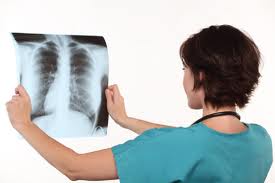 Chronic obstructive pulmonary disease (COPD) is a general term for a group of diseases that cause progressive damage to your lungs. These diseases include chronic bronchitis, asthma and emphysema. Of the more than 16 million Americans with COPD, nearly 3 million have symptomatic emphysema and millions more are in the early stages of the disease before signs and symptoms appear.
Chronic obstructive pulmonary disease (COPD) is a general term for a group of diseases that cause progressive damage to your lungs. These diseases include chronic bronchitis, asthma and emphysema. Of the more than 16 million Americans with COPD, nearly 3 million have symptomatic emphysema and millions more are in the early stages of the disease before signs and symptoms appear.
Unlike asthma, which occurs when the muscles in your airways tighten, emphysema causes a loss of elasticity in the walls of the small air sacs in your lungs. Eventually, the walls stretch and break, creating larger, less efficient air sacs that aren’t able to handle the normal exchange of oxygen and carbon dioxide.
When emphysema is advanced, you must work so hard to expel air from your lungs that breathing can consume up to 20 percent of your resting energy. Unfortunately, because emphysema develops gradually over many years, you may not experience symptoms such as shortness of breath until irreversible damage has already occurred. Treatments focus on relieving symptoms and avoiding complications.
Signs and symptoms
The main symptoms of emphysema are shortness of breath and a reduced capacity for physical activity, both of which are likely to become worse as the disease progresses. In time, you may have trouble breathing even when lying down, and it may be especially hard to breathe during and after respiratory infections, such as colds or the flu.
Other signs and symptoms of emphysema include:
- Chronic, mild cough. You may produce sputum or phlegm when you cough.
- Loss of appetite and weight loss. It’s a vicious cycle. Emphysema can make eating more difficult, and the act of eating can rob you of your breath. The result is that you simply may not feel like eating much of the time.
- Fatigue. You’re likely to feel tired both because it’s more difficult to breathe and because your body is getting less oxygen.
Most common cause is smoking
Cigarette smoke is by far the most common cause of emphysema. The damage begins when tobacco smoke temporarily paralyzes the microscopic hairs (cilia) that line your bronchial tubes. Normally, these hairs sweep irritants and germs out of your airways. But when smoke interferes with this sweeping movement, irritants remain in your bronchial tubes and infiltrate the alveoli, inflaming the tissue and eventually breaking down elastic fibers.[/toggle]
When to seek medical advice
See your doctor if any of the following apply to you:
- You feel short of breath most of the time.
- You can’t breathe well enough to tolerate even moderate exercise.
- You frequently cough up sputum that’s colored and possibly infected.
These signs and symptoms don’t necessarily mean you have emphysema, but they do indicate that your lungs aren’t working properly and should be evaluated by your doctor as soon as possible.
Prevention
Most cases of emphysema are due to smoking. If you smoke – cigarettes, cigars or a pipe – your chance of developing emphysema is much greater than for nonsmokers. The best way to prevent emphysema is to not smoke or to stop smoking. In addition, try to limit your exposure to secondhand smoke.
Treatment
- Bronchodilators. These drugs can help relieve coughing, shortness of breath and trouble breathing by opening constricted airways, but they’re not as effective in treating emphysema as they are in treating asthma.
- Inhaled steroids. Corticosteroid drugs inhaled as aerosol sprays may relieve symptoms of emphysema associated with asthma and bronchitis. Although inhaled steroids have fewer side effects than oral steroids do, prolonged use can weaken your bones and increase your risk of high blood pressure, cataracts and diabetes.
- Supplemental oxygen. If you have severe emphysema with low blood oxygen levels, using oxygen at home may provide some relief. Various forms of oxygen are available as well as different devices to deliver them to your lungs. Talk with your doctor about which is best for you and about oxygen distributors in your area. Your dealer can set up your equipment, instruct you on care and maintenance, and provide follow-up visits.
- Antibiotics. Respiratory infections such as acute bronchitis, pneumonia and influenza are a leading complication of emphysema, increasing the amount of sputum you produce and making breathing problems worse. Broad-spectrum antibiotics may help relieve these symptoms, but should be used with caution to avoid the serious and growing problem of antibiotic-resistant bacteria.
- Inoculations against influenza and pneumonia. If you have emphysema or other forms of COPD, experts recommend an influenza (flu) shot annually and a pneumonia shot every five to seven years.